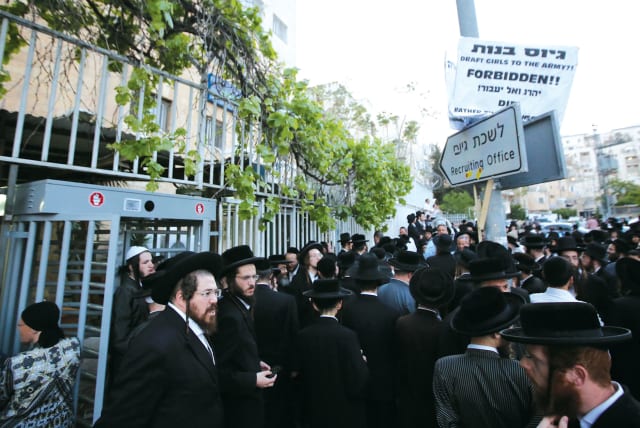Knesset's summer recess overshadowed by Conscription Law debate - analysis

Benny Gantz's outreach to the haredi sector is valuable as the ultra-Orthodox parties have threatened to take down the government if the new draft bill is not passed immediately.
The Conscription Law continues to reign as the most pressing issue during the Knesset’s summer recess.
Hebrew media reported on Sunday that Prime Minister Benjamin Netanyahu’s Likud Party has signaled to the haredi (ultra-Orthodox) parties that they will not “give a hand to mass evasion,” and that “there will be no Conscription Law without compromise.”
Meanwhile, National Unity chairman MK Benny Gantz has sought to strengthen his position as a potential dealmaker in the debate over the contentious draft law.
Gantz spent Sunday in Bnei Brak visiting influential haredi rabbis at their yeshivot, expressing his respect for Torah study while also pushing for a fair compromise on haredi draft numbers. The timing of Gantz's visit comes at the beginning of the yeshiva school year, which coincides with the start of the Hebrew month of Elul, which began last week.
He said on his visit that “The study of Torah is of enormous importance in the preservation of Judaism for thousands of years.
“Alongside this, we must continue to fight and also preserve the security and unity of Israel.”
This works with Gantz's personal record of friendly relationships with the ultra-Orthodox parties, which, though unlikely in the near-term, can aid him in forming a future coalition with them. His warm relationship with the haredi parties has been in contrast with the at-times hostile relationship opposition leader Yair Lapid has with them.
Gantz's haredi outreach is valuable
This outreach is valuable for Gantz, with the ultra-Orthodox parties having caused a stir within the governing coalition as they have threatened to take down the government if the new draft bill is not passed immediately following the Knesset’s summer break which ends on October 15.
The new Conscription Law, as currently being floated, aims to lower the age of permanent exemption for ultra-Orthodox men from 26 to 22, with a focus on promoting engagement in National Service and employment within the haredi sector. To offset potential backlash, the bill is set to include an increase in benefits for those who are drafted or serving in the reserves.
The bill is also expected to include a clause that prevents judicial review on the legislation. This is in response to the fact that the law’s predecessor, the National Service Law, which passed in 2014 and 2015, was struck down by the High Court of Justice after they deemed the bill unconstitutional, saying it was too sweeping and unequal.
Since then, a new formulation has been delayed over a dozen times since its halting by the court. Technically the original draft bill expired on June 30, but a temporary extension was granted until March 31, 2024. As such, yeshiva students do not currently have their special status, and if no bill is passed by the March date, they could find themselves drafted en masse.
The haredi parties made clear to the government that they would not accept any legislation related to judicial reform until after the Conscription Law is passed. This was agreed to by the coalition, with coalition chair MK Ofir Katz (Likud), who said last week that an agreement was made where “the Conscription Law [will pass] and only after that the composition of the Judicial Selection Committee will be changed.”
However, the Likud sources to Hebrew media said that while the secular public of course does not support such a law on mass exemption, there will be equal pushback from other coalition voters. This much has been stressed in comments to The Jerusalem Post by members of other coalition parties, saying that in its current form, the bill does not have the votes.
Reasons for this range from the potential danger to the security of the state to the fact that the Religious Zionist parties, religious in nature and name, place extraordinary value on military service alongside Torah study.
Formulations for the bill have been underway between the government, the Defense Ministry, the IDF, and the haredi parties. It was also reported in Hebrew media that Defense Minister Yoav Gallant is opposed to the current outline as is proposed. The coalition has proposed that there be a track for students to engage in National Service, though the haredi parties have not accepted this.
Whether the haredi parties would actually disband the government is not known, though unlikely. Construction and Housing Minister Yitzhak Goldknopf (UTJ) said yesterday as he left the weekly government cabinet meeting that he expects “the government to uphold its promises, as we did.”
Jerusalem Post Store
`; document.getElementById("linkPremium").innerHTML = cont; var divWithLink = document.getElementById("premium-link"); if (divWithLink !== null && divWithLink !== 'undefined') { divWithLink.style.border = "solid 1px #cb0f3e"; divWithLink.style.textAlign = "center"; divWithLink.style.marginBottom = "15px"; divWithLink.style.marginTop = "15px"; divWithLink.style.width = "100%"; divWithLink.style.backgroundColor = "#122952"; divWithLink.style.color = "#ffffff"; divWithLink.style.lineHeight = "1.5"; } } (function (v, i) { });

